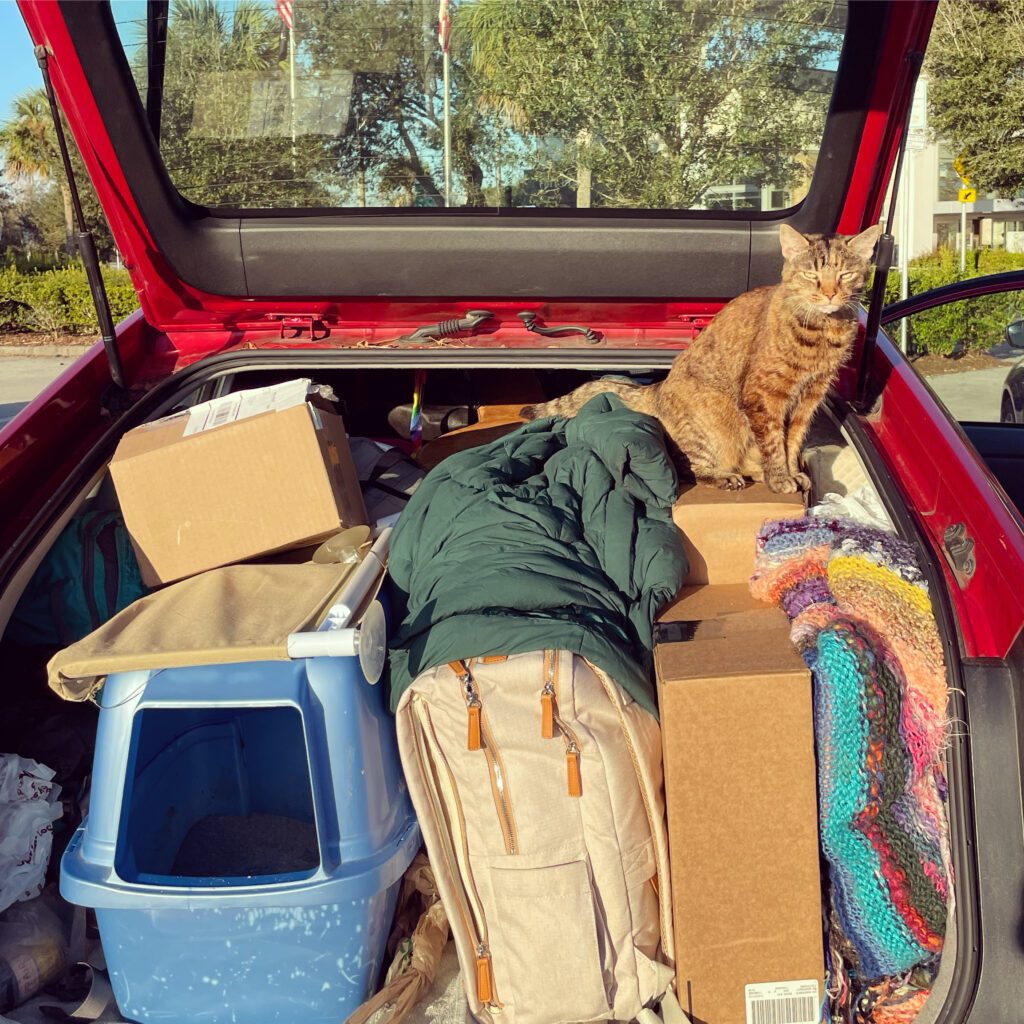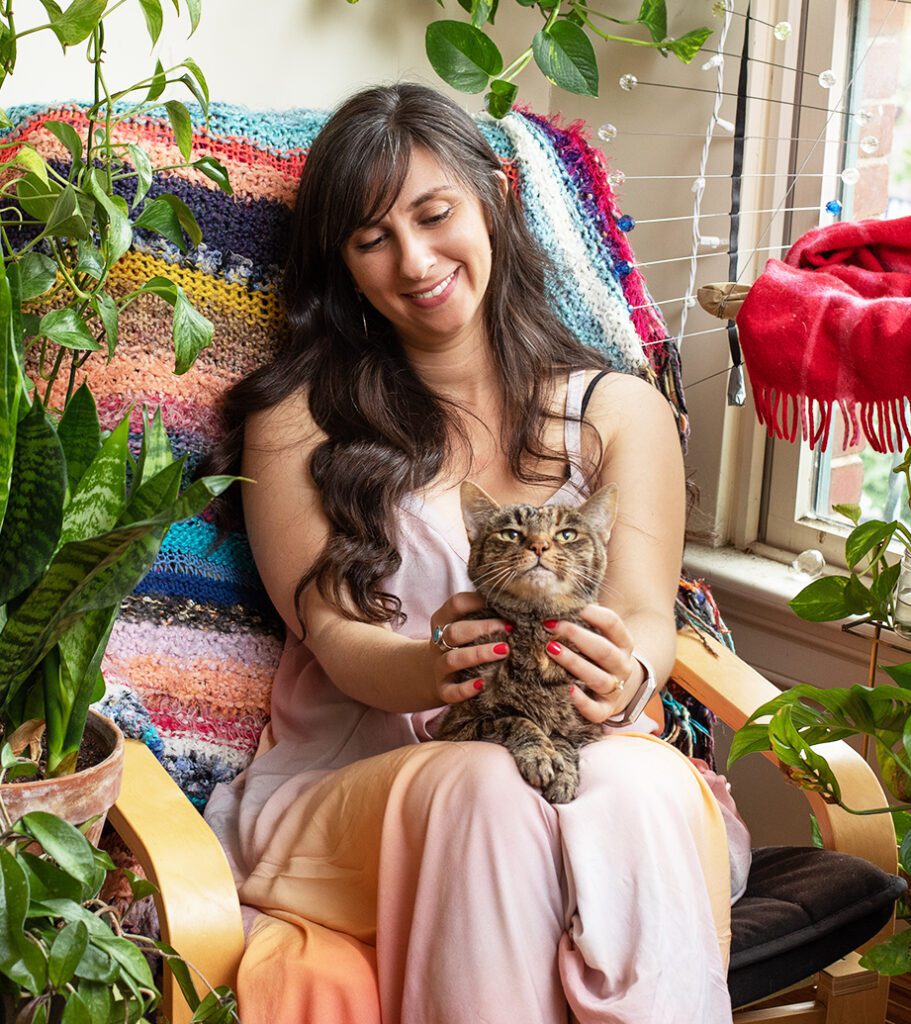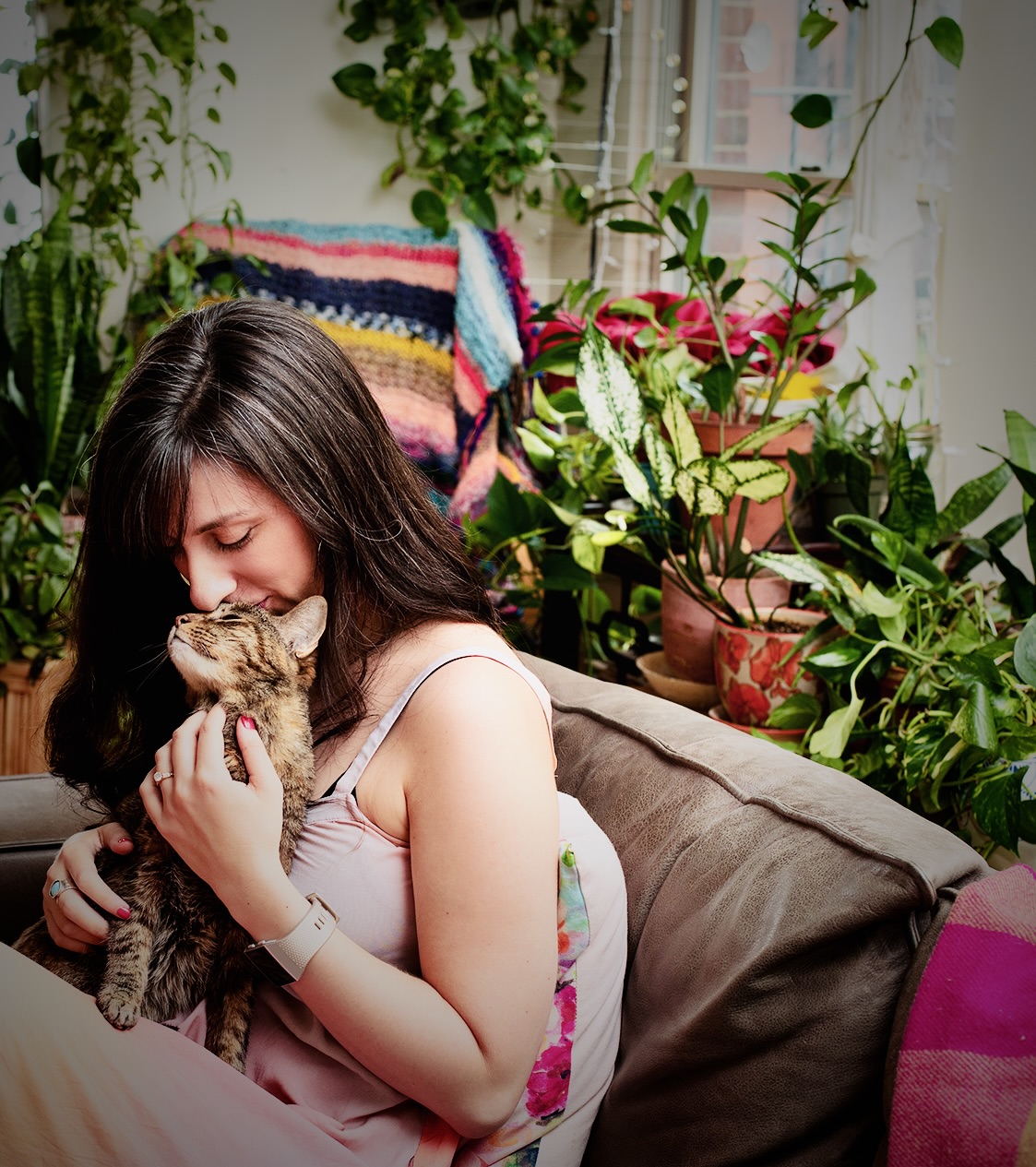If you’re a pet owner, you know the worst part about having a pet it isn’t cleaning up their poop. Or the torn-up furniture. It isn’t even the expensive vet bills.
It’s the fact that one day, you will have to say goodbye.
Your pet is going to get old (if you’re lucky). And eventually, their body will no longer be able to house their beautiful soul.
We never get enough time with our pets. Even if they lived a long and happy life.
Back in June, I was finally forced to say goodbye to my best friend. My soul-creature. My perfect, one-of-a-kind cat, Squiggles. For the past few months, I have been slowly moving through the stages of grief after losing her.
And it’s really, really hard.
My special bond with Squiggles
I’ve had Squiggles since the day she was born. Our other cat, Flopsy, gave birth to her when I was just 16-years-old, which was almost 22 years ago.
And boy did she live her 9 lives to the fullest! She lived in 3 different states, got lost in the wilderness for a whole week, and traveled cross-country with me for 4+ months during Covid.

The bond she and I shared, without a doubt, is one of the most meaningful I will ever have in my life.
She could communicate her needs to me with a single look on her face, and would even lick the tears from my eyes when I was crying.
And for the past 15+ years, I have been *trying* to prepare myself for the reality that one day, Squiggles would die.
And that I would somehow have to continue on without her.
Why Grieving a Pet Is So Hard
When you lose a pet, especially one that you’ve had for a long time, you might face unique challenges around your grief.
Even though you’re going through painstaking sadness, it might seem like your friends aren’t checking in. Or don’t know what to say.
Everyone seems to forget that your life has been forever changed. Which may cause you to feel like you should move on quickly, or not be as sad as you are.
If you’ve recently lost a pet and feel like others don’t get it, or you have nowhere to turn, I invite you to join my Facebook Group, It’s All The Same Forest: Pet Grief Support After Losing Your Soul Mate Pet.
The sadness you feel about losing your pet is valid. There is nothing wrong with you.
A recent study found that when a pet dies, society doesn’t deem it as serious as when a human dies. This lack of validation can cause you to have unresolved feelings about your pet’s death. Which can lead to disenfranchised grief – having nowhere to put your feelings after a loss.
But losing a pet is one of the most devastating life events one can go through. Especially if the loss was sudden, traumatic, or drawn out.
And even if your pet lived a good life, when the time comes to let them go, it can feel like an impossible pill to swallow. Here’s why.
1. Your Pet Is Your Family
Even though your pet is an animal, one fact remains: your pet is also part of your family.
And for some pet-lovers, the bond you create feels like even more; a pet might feel like part of your identity. Or even like an extension of your soul.
So when a pet dies, you don’t just lose an animal.
You lose a cherished loved one. You lose a piece of yourself.
Acknowledging the depth of your bond and validating how you feel is essential to healing. And being around others who “get it” will help too.
2. You Lose One Of Your Greatest Sources of Comfort
Your pet provides more than companionship – they can become a major source of comfort and help you relieve stress. So when the one thing you would turn to when you’re feeling sad is no longer there, it may seem impossible to find relief. You can feel more isolated and alone than ever.
Remembering your pet, or looking at photos and videos may feel really hard at first, and unleash a floodgate of tears. There is nothing wrong with releasing your emotions when and if this happens, and can actually benefit you.
Eventually remembering your pet in this way can provide the comfort you’re seeking when longing for your pet.
And, talking to others about them can also ease some of your pain and help you feel less alone.
3. Your Pet Is A Part Of Your Daily Routine
Typically, you spend more time with your pet than anyone else. When that presence is gone from your life, it completely disrupts your routine and makes you feel like you have no reason to get up in the morning.
Now that many of us work more hours from home, we have grown an even deeper attachment to our pets, because they are with us all day long.
If your pet was always by your side, you may automatically turn to talk to them, forgetting that they are gone. You are constantly reminded of the loss, from the time you wake up until you fall asleep. And perhaps in your dreams too.
Give yourself time to get used to your new routine without them there. And have compassion for yourself as you move through your new normal.
4. Your Pet Loves You Unconditionally
The bond and connection that you create with your pet is rare and unique. Relationships with humans come with more complications, more drama, deep insecurities and fears of what others may think.
With a pet, you can be completely who you are, and they will love you no matter what.
And even though your pet can’t quite communicate their feelings with words, you know in your heart how much they love you.

Stages of Grief After Losing A Pet
Grief is something you can try to understand logically, but you have to let yourself experience it to get through it.
What this means is, you can’t skip over your emotional pain. Or bury it forever. Try to let yourself be with it.
Easier said than done, right?
There really isn’t a right or wrong way to grieve. But understanding the different stages of grief after losing a pet, and pinpointing which stage you might be in at any given moment, offers some space for your feelings.
Denial/Shock
This is what many experience as the first stage of grief after a pet dies. It feels like what is happening is completely unreal.
You may not be able to cry or feel sad because you are so in shock. You may have moments where you reach out to touch them, then suddenly remember they are no longer around.
It may feel impossible to focus, to sleep, to wake up, or be around others.
You may feel like you’re in a haze.
These symptoms may feel even stronger if you witnessed the death of your pet, or it was traumatic.
Typically this stage of grief will not last more than a few days. But remember, it might come and go in waves for months after your pet is gone.
Bargaining
The bargaining stage of grief is a period when you try to make promises to a higher power in exchange for helping your pet survive. Or you find yourself begging for relief from the pain.
For someone who may have a terminally ill pet, or a pet that has gone missing, the bargaining stage can be quite significant.
Even though you know in your heart that it is their time to go, you may still find yourself pleading to a higher power for help. Or keep wishing that you could do something to save them.
Guilt
One of the more unique stages of grief for someone who has lost a pet is guilt.
Oftentimes as a pet-owner, you have to be the one who decides when it is time to say goodbye. When you have to choose euthanasia to end your pet’s suffering (like I did for Squiggles), it can leave you feeling ridden with guilt, even when you know it’s the best option.
Guilt can also show up in moments when you notice you are feeling happy again. Or forget about your pet for a few hours. Or get through the day without crying.
This doesn’t mean that you are over the loss, or don’t love your pet – it just means that you’re human, and doing the best you can to get through your grief.
Anger
When anger bubbles up after loss, you might direct it towards anyone – yourself, your vet, your loved ones, even your pet for leaving you. Sometimes you might feel angry or irritable and you don’t know why.
You have a right to feel angry when you pet dies – it totally sucks! It’s the worst thing ever.
You might be angry about how it happened. Or that you have to try and go to sleep without them laying by your side. And angry about having to get through each day without them there to comfort you.
After Squiggles died, I became much more irritable in my day-to-day. Recognizing that this is a part of the stages of grief helped me have more compassion and understanding for myself and explain to others why I was getting so easily frustrated (“it’s not you – it’s Squiggles”).
Oftentimes, anger is just empowered sadness. Which is why it is such an important emotion to feel during your grieving process. It can help you express the depth of your pain. Because eventually that anger will lead to the most challenging stage of grief to process.
Depression
The depression stage of grief is when the reality of the loss starts to settle in. And the sadness you feel about your pet being gone starts to hit.
You may be very tearful, and desperately miss your pet. You may also start to think that you’re never going to feel better, and that you’re alone in your pain.
It’s common for symptoms of depression to show up during this phase, like having trouble sleeping or sleeping all day, changes in appetite, having low energy, inability to focus, or trouble finding pleasure in activities that used to interest you. You may feel more withdrawn and isolated than usual.
This stage of grief is typically the most painful, and happens to be the longest.
During this phase, it is okay to let yourself feel your emotions. Never think that you should be over the loss by a certain time. Or that you should not feel as sad as you do.
Let yourself cry. It’s okay to still miss your pet. It’s okay to give yourself as much time as you need.
You may not feel like being around people, but having support from someone you trust and can lean on during this stage will help.
And if you currently don’t have someone to turn to for emotional support, I recommend going to therapy to process your emotions.
Acceptance
Acceptance doesn’t mean that your grief journey is over; it’s accepting the fact that your life is forever changed.
You may be resistant to move through this phase of grief after losing a pet. You might be afraid that your memories will start to fade – like you’ll forget the sound of their meow. Or the softness of their fur. Or the pitter-patter of their paws.
You might worry that if you accept the loss, it means you aren’t as sad anymore. And that being less sad somehow equates to the love fading. This simply isn’t true.
The acceptance stage of grief is about honoring your pet and having gratitude for all the love you shared.
At the same time, you’re getting used to the “new normal.” And trying your best to live your life the way they would want you to.
Remember, acceptance isn’t an end goal to reach, it’s a continual practice. Some days it may feel like you’re at peace.
But if months later you find yourself sobbing on the couch looking at photos of your pet, barely able to catch your breath (like me ????♀️, hi!), that’s okay too.
The Bonus Stage of Grief After Losing A Pet: Making Meaning
As you move through the stages of grief after losing a pet, you may also gain new perspectives on life. And eventually, turn your profound grief into an opportunity for transformation and deeper meaning.
Making meaning takes acceptance a bit further. It’s a phase where you are able to integrate the loss into your life in a way that inspires positive change, connection, and hope.
You can do this by channeling your grief into art, and putting something up in your home to remember your pet. Or planting a tree in your backyard to honor their memory. If you aren’t ready for another pet yet, you can try fostering animals as a way to give back.
I’m currently fostering cats because I love having the feline energy in my home. But I know I’m not ready for another cat to call my own yet, and that’s okay. It still feels good to know I’m helping other animals while they are looking for their forever homes.
If you happen to live in the NYC area, this is the organization I foster with: Brooklyn Animal Action. And if you’re in a different place, some good ole’ googling can help you find an organization to foster with.
When you are able to make meaning out of the loss of your pet, you are able to find a deeper sense of inner peace. And eventually allow the joyous moments to outweigh the sorrow.
Other Things To Remember When Grieving Your Pet
Grief is Non-Linear
Many people think you move through the stages of grief in order. And that you can check off each stage once you’ve gone through it. This isn’t always true.
It is common to jump from one stage of grief to another without any rhyme or reason. You may go from feeling depressed, back to being in denial. Then thinking you’ve reached acceptance, right before you fall back into depression all over again.
You may also feel like you’re in more than one phase of grief at once. That too, is normal.
Grief is Highly Personal
Although these stages can help you pinpoint where you’re at, some days, they may not resonate. That’s okay. There is no right or wrong way to grieve.
Maybe you have a family member who seems like they’ve already moved on and you haven’t. Or maybe you want to talk about your pet and they are not ready. You are both valid. You can experience your grief in different ways.
If you’re looking for something – anything – to help you cope with this tremendous loss, check out my other article, Grieving A Pet: How To Cope Without Your Soul Mate By Your Side. It includes various ideas to help you move through your grief.
Grief Is Unexpressed Love
Taking time to grieve the loss of a cherished pet is a natural process. And it is likely that you’ll miss your pet for the rest of your life. This is a difficult thing, but it is not a bad thing!
Missing your pet is a reminder of how much they meant to you. And the grief is so painful because it’s the unexpressed love you still have, and will always feel for them.
Over time, that pain and that grief does become more manageable. I find this box and ball analogy to be an incredibly helpful visualization to understand how.
And if you are grieving your pet-best-friend, I am so very sorry for your loss.
I know that it is impossibly hard.
I have no doubt in my mind that your pet was so grateful to be yours.
They knew, without a doubt, how much you loved them.
Take good care of yourself during this time.
And if you want a space to process your grief and share cherished memories of your pet, I invite you to join my Facebook Group, It’s All The Same Forest: Pet Grief Support After Losing Your Soul Mate Pet. You can also follow me on instagram – @paigerechtman.therapy.
If this article resonated with you, please like and share it below.
And if you’re feeling open to it, I invite you to share your pet’s name in the comments, and any happy memory or story you experienced together. <3








14 Responses
Just lost our soul cat Paddy, happened suddenly. We are so upset and heartbroken. It feels so raw and not real but at the same time just empty and painful. Pad was rescued and bonded with us, sleeping by our side and giving us the best cuddles. I just loved, loved the little guy. We have such beautiful memories and photos but life is empty without him. I’m reading so much about the many others who have gone through the same and just wishing you all love and a big hug♡
AJ, I am so sorry to hear about your beloved soul cat, Paddy. It is so hard, especially when it’s so sudden. I understand the heartbreak. I know it sounds cliche, but it does take time to get used to life without their physical presence. Wishing you all the love too, and sending big hugs your way as you grieve the loss of Paddy. <3
I just lost my precious 5 lb. Maltipoo Pixie. I knew at 16 and a half years old she was a senior dog. I had to have her euthanized because she couldn’t breathe and was in pain. Odd thing is this hurts more than when I had miscarriages and 1 stillbirth and one who died after 14 and a half hours. Help!
Elizabeth, I am so incredibly sorry for the loss of your beloved Pixie. I completely understand that the pain is excruciating, and can feel just as bad, if not worse, than other major losses. It sounds like Pixie was there for your during so much, and it’s so hard to imagine not having them there with you in physical form. Please feel free to join my free facebook group to get additional support as you grieve. I’m sending big hugs your way and I’m so sorry for your loss. <3
https://www.facebook.com/share/R1k5uc7wcfbq8Cgq/
I lost my beautiful pup, Oscar, July 14, 2024. I’ve had him since he was three weeks old and had him over 16 years. He was my life; I sang to him, cuddled with him, massaged his leg and shoulders after a jaunt outside. I tried to spoil him but could not stop his health from declining. Vet visit after visit to keep him comfortable wasn’t enough and I tragically and traumatically lost him suddenly. I pray he didn’t suffer terribly during the rush to the vet. Crying, “I love you”, and “You’re a good boy” didn’t suffice during euthanasia or demonstrate how truly and deeply I feel. I am devastated, heartbroken, and cannot and do not want to imagine my life without him. I cried all day today holding his favorite toy hoping for some comfort. I’m grateful he’s not I pain, but I cannot help the feeling of wanting to be with him. I just want him in my arms. I want to kiss him and tell him how much he’s loved. I want to go back in time when he was healthy and relive those moments with him. I feel lost.
Jen, I am so sorry to hear about your beloved Oscar. I know how painful it is to have to say goodbye, and everything you’re describing resonates so hard with me. It’s okay to give yourself as much time as you need to heal. I’m sending you hugs as you grieve this tremendous loss. <3
I lost my beloved dog Akira a couple days ago. She was rescued from a meat farm in China and somehow made it to California, where I adopted her. She was my best friend and my soulmate. I don’t know how to live without her. I am sending love to those who are also suffering this kind of loss and a wish that we all emerge able to give and receive more love than we could have ever imagined. That’s what I learned from Akira.
Sam, this message is so beautiful. I am so sorry to hear about your beloved Akira. How lucky she was to have you as her best friend and soul mate. Imagining life without a beloved pet like this is so hard, I know. I am sending love to you during this time as well, and I hope the memories you shared with Akira will remain in your heart, always. <3
im so devastated from the moment his vet told me he got the last stage of cancer weeks ago. i stayed with him all day long, watching him slowly disappear. as im writing this, the clock is ticking towards my 12yo dog’s euthanasia appointment. realising he’ll be gone in a matter of hours really punch me in the gut. i stare at his water bowl and sleeping bed, they’d be empty soon. i can’t imagine how life would be without him.
Chika, I am so sorry you’re going through this. Losing a pet is awful. My heart breaks for you during this unimaginable time. <3 Sending healing prayers your way.
I lost my truest companion. My(all white cat Caspurr last night. He was about 17 yrs old . He started with a little difficulty breathing on Friday night. I watched it get worse, I tried everything I could to comfort him, I know that he knew I loved him. I apologize to him over and over, but I wasn’t able to get him to a vet. But they would have just put him down. I put 2 other cats down in my life, and I just couldn’t make that decision again. He died at home. But I feel such HUGE GUILT.
Rick I am so sorry to hear about your beloved Caspurr. Adorable name! 17 years is quite the run for a cat, but I know it’s never enough time. Guilt is such a normal emotion to have when losing a pet, but if you loved Caspurr for his whole life, you did nothing wrong. I’m sending hugs your way as you grieve this tremendous loss. <3
I lost my 15 1/2 yr old Lhasa apso on 28th June. A decision to put her to sleep was the hardest of my life. She was the last of my three dogs spanning 18yrs. She was my life, I’m retired and live alone. The last 9 wks of her life were supported my most wonderful vet (who I had known and recently opened her own practice). She went beyond any vet I have ever known to care and support my wee girl and me. I am beyond heartbroken and my grief and anxiety is getting worse by the day
I am grieving so much for Georgie but also I know I had become so dependant on my vet that I know that is part of my grief /separation as well. It is right that she must move on to support her other clients and pets but this is all mixed up. It was the right decision for my wee girl but she was my reason for getting up and going to bed I just don’t know how to put one foot forward
Kate, again I am so sorry that you lost your beloved Georgie. It’s so hard to know what to do or how to act when you’re in the process of saying goodbye to a loving and loyal companion. Try to be gentle with yourself, and take it one moment at a time. Sending you hugs. <3